Godfrey & Wing, a leading global manufacturer of vacuum impregnation technology, has received a contract for an Advanced Graphite Impregnation (AGI) system from a hydrogen fuel cell manufacturer. Starting in 2023, the system will seal leak paths in bi-polar plates in fuel cell stacks for fuel cell vehicles (FCV).
The AGI is designed from Godfrey & Wing’s HVLV, which is the world’s most widely used impregnation system. While the HVLV was originally designed to seal leak paths in die cast aluminum, the AGI seals leak paths in graphite parts. A modular system, the AGI seals graphite leak paths while keeping parts clean. With a small footprint of 116 square feet, it can fit in the production line to achieve continuous production flow. In addition, the AGI will be equipped with custom fixtures to remove the risk of part damage and contamination.

While FCVs operate on electricity and are zero-emission, they do so differently than battery-powered Electric Vehicles (EV). In an FCV, hydrogen reacts electrochemically to produce electricity to power the vehicle. Hydrogen fuel cells are designed for use in industries such as transportation, construction, industrial equipment, and others that have traditionally relied on internal combustion technology.
“With a proven record in delivering results for ICEs, we are helping OEMs and manufacturers succeed as they now invest in FCV and EVs.” Said Johnny Halladay, Business Unit Director. “OEMs are moving at a fast pace to build better and cleaner cars. We are excited to help these companies meet their demand.”
Hydrogen infrastructure is growing across North America, and fuel cell transit buses are already in use in the United States and Canada. The global market for fuel cells was valued at $6.6 billion in 2021, according to BCC Research, and is expected to grow at a 20.1% CAGR from 2022 to 2027.
